- Home
- Fredric Brown
Mostly Murder Page 18
Mostly Murder Read online
Page 18
“Couldn’t be,” Bellefontaine had told his client; “because they sell the things by mail. Maybe, though, they have to go express.”
“Well,” Murgatroyd had said, “you’re going straight through to Milwaukee anyway, so it won’t be any trouble, and you won’t have to take it to him or anything. Just call him up and he’ll come around to your office and get it. Fact, I already wrote him I’d ask you to take it.”
So there hadn’t been any out, without offending a client, and Mr. Bellefontaine had brought the pistol along, little as he had cared to have such a thing in his possession.
“Damn this asthma,” he thought as he opened the door of the little railroad station and stepped inside, “and damn a small-town drugstore that doesn’t have any ephedrine for it in stock. Next time, I’ll bring a few capsules with me…“ He blinked to get his eyes used to the light, and looked around.
There was only one man in the station besides himself, a tall, thin man, shabbily dressed, and, with bloodshot eyes. He’d been sitting with his head in his hands when Mr. Bellefontaine came in, but now he looked up and said, “Hullo.”
“Hello,” said Mr. Bellefontaine, tersely. “Getting-uh—colder out.”
The clock in the wall over the ticket window said seven-ten. Forty-five minutes to wait. Through the ticket-window he could see into the inner room of the station where the gray-haired station agent was pecking something on an ancient typewriter at a table against the far wall. Mr. Bellefontaine didn’t go to the ticket window; he already had his return ticket.
The tall man sat on one side of a potbellied little coal stove near the wall at the far side of the waiting room. There was a comfortable-looking rocking chair on the other side of the stove, but Mr. Bellefontaine didn’t want to cross the room and sit there just yet.
He was still breathing hard from the effect of the brisk walk on his asthma and he wanted to get all his wind back first. He’d probably have to talk as soon as he sat down there, and if he had to talk in short jerky sentences he’d have to explain about his annoying infirmity.
So, as an excuse for standing there a while, he turned around to stare out through the glass pane of the door as though he were watching something outside.
He saw, though, his own reflection in the pane. A chubby little man, very pink-faced, and going bald, although that didn’t show with his hat on. But his shell-rimmed glasses gave him a very serious look, which fitted him well, for Mr. Bellefontaine took himself very seriously. He was forty now, and by the time he was fifty he was going to be a very important corporation lawyer.
The siren wailed again.
Mr. Bellefontaine shivered slightly at the sound, and then went over and sat in the rocker by the coal stove. His brief case thunked heavily on the floor as he put it down.
“Taking the seven fifty-five?” the tall man asked.
Mr. Bellefontaine nodded. “Through to Milwaukee.”
“I get off at Madison,” said the tall man. “We got a couple of hundred miles to go together; might as well get acquainted. My name’s Jones. Bookkeeper for the Saxe Paint Company.”
Mr. Bellefontaine introduced himself, then added, “Saxe Paint? I thought it was in Chicago.”
“Branch office in Madison.”
“Oh,” said Mr. Bellefontaine. It was his turn to say something, but he couldn’t think of anything to say. In the silence, the siren wailed again. It sounded louder this time, and he shivered. o
“That thing gives me the willies,” he said.
The tall man picked up the poker and opened the door of the stove. “Cold in here,” he said, taking a poke at the fire. “Say, what is that siren?”
“Asylum for the Criminally Insane,” he said. “An escape.” Unconsciously, he dropped his voice. “Probably a homicidal maniac. That’s the kind they have in that place.”
“Oh” said the tall man, rather blankly. He poked harder at the fire, then slammed the stove door shut and sat back down in his chair, still holding the poker.
It was, Mr. Bellefontaine noticed, a very heavy poker for so small a stove. His long legs spread apart, the tall man swung it meditatively up and down between his knees. He watched the swinging poker instead of Mr. Bellefontaine’s face. Suddenly he asked, “Is there a description out? Know what the maniac looks like?”
“Uh—no,” said Mr. Bellefontaine. His eyes were suddenly caught by the arc of that heavy poker.
What if—he thought. He caught himself abruptly. No, that was silly. Or was it? There was something—
Suddenly he knew what it was. He’d thought the tall man was rather poorly dressed; now Mr. Bellefontaine realized, looking at him, that it wasn’t that at all. The clothes were of good—at least average—quality. Only they didn’t fit him.
That suit had been made for a man of average height, and so had the topcoat. The cuffs of the trousers were turned down, although they’d been pressed to stay up, and still showed the fold of the pressing. That was why they hung so peculiarly about the ankles. They were still an inch or so too short; so were the sleeves of the topcoat and the suit coat.
Mr. Bellefontaine sat very still, and pretended not to look, but out of the corner of his eye, he continued his examination furtively. The tall man’s shirt was undoubtedly too big around at the collar. It had been made for a man with a much thicker neck. Jones’ scrawny neck stuck up through it with wide clearance on all sides.
And his eyes, wild and bloodshot—He would head for a railroad, thought Mr. Bellefontaine. Some little station like this, a good distance from the asylum. On the way he’d burgle a house to get clothes in exchange for his uniform. Or maybe he’d even kill a man he met to get those clothes. And the clothes, of course, wouldn’t fit him.
Mr. Bellefontaine sat very still, and could feel his face become cool as it drained of color. Of course, he could be wrong, but—
Jones, he thought. The very name a man would be likely to give if he hadn’t thought about what name to use until time to introduce himself. Saxe Paint Company, a big, widely advertised outfit, just the sort he’d think of first.
And he slipped there, on the Madison part, but covered up by saying it was a branch office.
And he didn’t seem to have any suitcase. Only the clothes he had on, and they weren’t his own. Stolen clothes, and maybe he’d killed to get them! Killed a man only an hour or less ago. A short stocky man with a thick neck—
Slowly the poker swung up and down in that hypnotizing arc. Slowly the bloodshot eyes of the tall man swung up from it to Mr. Bellefontaine’s face. He said, “Do you think—” Then his voice changed; “What’s wrong? What’s the matter?”
Mr. Bellefontaine gulped, then managed to say, “N-noth-ing.”
The bloodshot eyes kept on looking at him for a long minute and then slowly dropped to the swinging poker. The tall man didn’t go on with whatever he’d started to ask.
He knows, thought Mr. Bellefontaine dully. I gave myself away. He knows that I know who he is. If I try to walk out of here now, he’ll know I’m going for the police. He can get me with that poker long before I reach the door.
He wouldn’t even need the poker. He could strangle me. But no, he’ll use the poker. The way he swings it and looks at it, he’s thinking of it as a weapon.
But will he kill me anyway, even if I don’t make a move? He might; he’s mad. Madmen don’t need reasons.
The inside of his mouth was very dry. His lips seemed stuck together, and Mr. Bellefontaine had to run his tongue between them before he could open his mouth to speak. He had to say something—something casual, to try to reassure the madman. Carefully he worked out each word, so he wouldn’t stumble or stutter.
He said, “Getting c-colder out.” Only when he’d said it, did he remember that he’d said the same thing once before. Well, people often repeat themselves.
The tall man looked at him, then looked down again. “Yeah,” he said. No inflection, nothing to show what he was thinking.
Suddenly, then, Mr. Bellefontaine re
membered the revolver. If only it were loaded and in his pocket, instead of being unloaded, wrapped up, and in the brief case. How could he possibly—?
His eyes, darting about in frantic search, saw the door marked “Men.” Could he make it? Would the killer stop him if he walked toward the door?
There were beads of perspiration on his forehead as he stood up slowly and picked up the brief case. A shred of courage came back and he managed to make his voice almost calm as he said, “You’ll excuse me a minute?” and walked around behind the stove and behind the chair the madman was occupying toward the door of the washroom.
Out of the corner of his eye he saw that the tall man turned to watch him. But he wasn’t getting up!
Mr. Bellefontaine closed the door of the washroom quickly, and looked for a key in the lock. There wasn’t one; nor was there a bolt. His hands trembled as he jerked the zipper on the brief case.
His eyes roamed about, but saw nothing helpful. No window he could get out of—just a tiny one up high in the wall, well out of reach. No way he could barricade the door. There was a flimsy bolt on the door of the toilet booth, but a man could shove that door open with one hand.
No, no safety here. All he could do was load the revolver and have it in his pocket ready when he went out again. And he couldn’t stay too long. He must hurry…hurry…
Mr. Jones stared curiously a moment at the closed door of the washroom, then shrugged his shoulders and went back to doodling with the poker.
What a goof that guy was. Definitely off his rocker, that was obvious. He’d hoped he’d have someone to talk to on the train, but if that was the best company available, he’d take vanilla. Well, he’d try to sleep on the tram.
He could sure use sleep, after last night. You wouldn’t expect a wild party like that, way out here in the sticks. But Madge, his sister, had been in the mood to celebrate and so had Hank, his brother-in-law. The liquor had been bad, but plentiful. It had been an anniversary party, all right. What saps those neighbors of theirs, the Wilkinses, had made of themselves.
But, Mr. Jones thought wryly, no more of a sap than he had made of himself, staggering out into the barnyard for some fresh air and falling flat on his face in gooey mud. Lord, would his suit look the same again when it came back to him? Here he was having to wear some of Hank’s clothes till he got back to Madison.
It would be a long tune before he drank that much again. Fun at the time, but Lord how you felt the next day, even the next evening. Good thing he hadn’t had to go to work today, with his eyes looking the way they did. The gang at the office would razz hell out of him.
Tomorrow—oh, damn Saxe paint and all bookkeeping! He’d quit tomorrow if Old Man Rogers, the branch manager, hadn’t told him that in a few more months he’d be able to put him on the road. Selling wouldn’t be so bad. And he did know paint, so it would be worth sticking to the books a couple of months more.
The door of the washroom opened and the funny-looking little guy came out. Mr. Jones turned around to look, and—yes, he still had that crazy look on his face. A sort of tightened-up, stiff look, as if his face were a mask glued on him.
He walked oddly, too, coming back—carried that brief case in his left hand this time and had his right hand stuck deep in his topcoat pocket.
What the devil had he taken the brief case with him for, anyway? Surely he hadn’t thought someone would run off with it in the few minutes he’d been in there. Unless, of course, he had something valuable in it, jewelry or something. Nope, too heavy for jewelry, the way it had thudded against the floor the first time he’d put it down. More like hardware samples, only hardware salesmen didn’t carry their samples in brown leather brief cases.
He watched curiously as the little man sat down in the chair again, without taking his hand out of his topcoat pocket, and again put the brief case down on the floor. Only this time it didn’t thunk. It looked and sounded lighter, as if it contained nothing, or only a few papers. As though there were nothing to weight it down, it fell over, and the little guy picked it up again and leaned it against the side of the rocker to keep it from falling. It was empty, or at least something heavy had been taken out of it.
Still idly curious, Mr. Jones looked up from the mysterious brief case to the tense white face above it.
Was the guy crazy? Really crazy?
Faintly, in the silence, came the wail of the siren. And at the sound, the little man started; his face went slack with fear, and then froze again.
Mr. Jones’ scalp prickled. Pretending not to have noticed, he looked down again quickly at the poker in his hand. His knuckles tightened about the handle of it as he realized that it was his only weapon against a homicidal maniac.
Lord, why hadn’t he guessed it sooner?
He came in here panting and out of breath; he’d been running. He turned around and watched through the glass of the door to see if he’d been followed.
Then he’d acted rational for a while. Madmen did; they had periods when you couldn’t tell them at all from normal people.
A homicidal maniac, he thought. Does he intend to kill me; is that why he’s acting that way? Getting crazier by the minute, working himself up to a kill?
But he’s a little guy. I ought to be able to handle him, although maniacs are supposed to be terribly strong. But I know how to handle my dukes a little. Unless he’s got a gun!
Suddenly, and beyond all doubt, Mr. Jones knew what had been in the brief case; he knew why the madman had gone to the washroom—to transfer that gun from the case to the right-hand pocket of the topcoat, where his hand right now was gripped around it, his finger on the trigger.
Still pretending to look down at the poker, Mr. Jones glanced sidelong out of the corners of his eyes at the bulge in the topcoat pocket. A gun, all right. It was a much bigger bulge than just a hand would make, and besides, he could see the outline of the barrel of it making a raised little ridge toward the end of the pocket. A revolver, probably, with a five or six inch barrel.
// he were an escaped maniac, he tried to tell himself, he wouldn’t have told me what that siren was. But then, I asked him what it was. He might have thought I knew already, and suspected him because of the breathless way he made his entrance. So he had to tell me the truth, in case I already knew. And that screwy name he gave—Bellefontaine—a name out of a book. Real people seldom have names like that.
But those were just arguments; the gun was a fact. You can’t argue around a gun aimed at you by a homicidal maniac.
Why was he waiting?
From a long way off came the sound of a train whistle. Mr. Jones managed, without turning his head, to cast a sidelong glance at the clock. Fifteen minutes too soon for the passenger train, the seven fifty-five; must be a freight train going through, probably in the opposite direction.
Yes, he could hear it coming now and it sounded like a freight. It wasn’t slowing down. He heard a door close, in the other room of the station and guessed what it was. The station agent was going out on the platform. Yes, there were footsteps on the platform, and then the rumble of the coming train drowned them out.
When the engine was directly opposite the station, right outside the window—Of course, that was what he was waiting for. That rush of deafening, roaring sound that would drown out the sound of the shot!
Mr. Jones tensed, tightened his grip on the poker until his knuckles went dead white, and shifted his weight forward. He could make it in one step, raising the poker as he did so. If the muzzle of that pistol, outlined through the cloth of the madman’s topcoat, started to lift—Roar of the coming train, louder, nearer—a crescendo rushing roar of obliterating sound—louder, louder—
And as Mr. Jones leaned forward the muzzle of the gun was lifting.
The man in the blue uniform with the brass buttons closed the door carefully behind him and turned to the two men sitting on either side of the stove. They looked funny, sitting there in such awkward, strained attitudes; as if they were scared stiff.
Should he? No; it would be too dangerous. He had the uniform now, and it would be so easy to get on the train and make his getaway, far from the search zone. But it would be so damned easy to kill those fellows, with the gun bolstered at his belt—a gun that the uniform gave him the right to wear openly and without fear.
He said, “Evening, gentlemen,” and one of them mumbled something back; the other didn’t answer at all. The tall one, who was playing with the poker asked, “Have they caught the—maniac?” and he glanced out of the corners of his eyes at the little plump fellow, almost as though he were trying to signal something.
He laughed. “No, they haven’t caught him yet,” he said. “I don’t think they will.”
It was so funny, so excruciatingly funny. He said, “They’ll have real trouble getting him now. He killed a policeman at Waynesville and stole his gun and uniform. And they don’t even know it yet!”
He laughed again, and was still chuckling when he reached for the gun in his holster.
But the gun wasn’t even out of the leather before a blasting, unexpected shot that seemed to come from inside the little man’s pocket whizzed by his ear, and the tall man with the poker was already halfway across the room toward him. He didn’t even have the gun raised before a second shot from the little man’s pistol hit him in the upper arm and the poker was already smashing down at his head. He tried to duck and succeeded only in avoiding the full force of the tall man’s blow…
The freight tram was whistling far off when he came to. Someone was excitedly using the telephone in the station agent’s side of the station building.
He was tied hand and foot. He struggled, briefly, and then relaxed and sighed, looking up at the two men standing over him. He thought back.
Why, they’d been ready and looking for trouble when he’d walked in! The little one must already have had his hand on that pistol, and the big one had been swinging the poker, ready. People usually have to build up to making a sudden attack, but these guys had gone off like a charge of dynamite.
Lord, if there were people as dangerous as that running around loose, he’d be safer back in the asylum where they’d take care of him. Why, they’d almost killed him. They must be crazy!

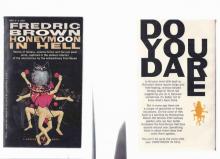 Hall of Mirrors
Hall of Mirrors Honeymoon in Hell
Honeymoon in Hell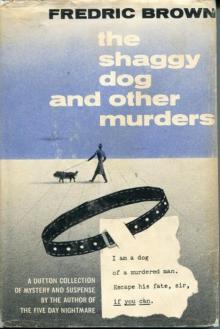 The Shaggy Dog and Other Murders
The Shaggy Dog and Other Murders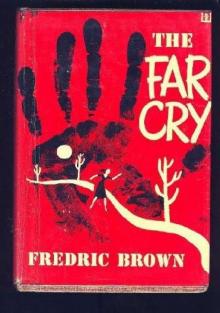 The Far Cry
The Far Cry Arena
Arena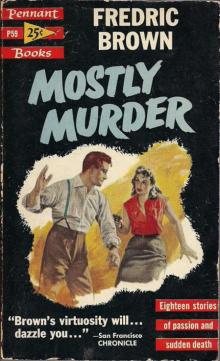 Mostly Murder
Mostly Murder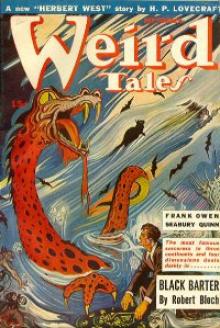 The Geezenstacks
The Geezenstacks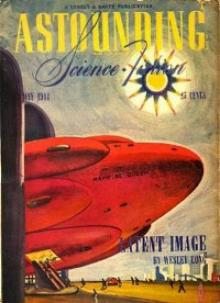 The Yehudi Principle
The Yehudi Principle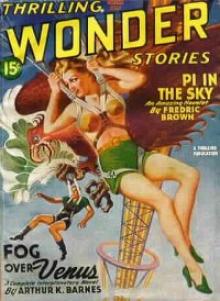 Pi in the Sky
Pi in the Sky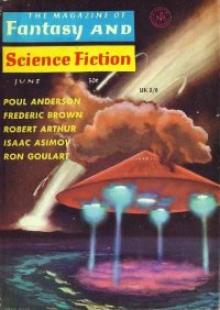 Eine Kleine Nachtmusik
Eine Kleine Nachtmusik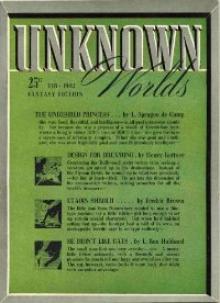 Etaoin Shrdlu
Etaoin Shrdlu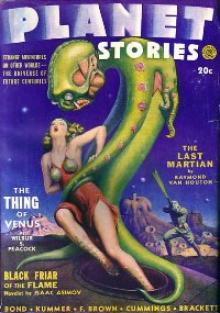 The Star Mouse
The Star Mouse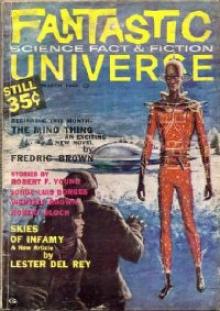 The Mind Thing
The Mind Thing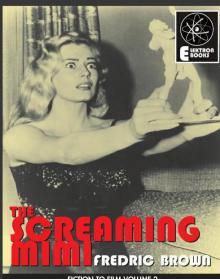 The Screaming Mimi
The Screaming Mimi The Fabulous Clipjoint
The Fabulous Clipjoint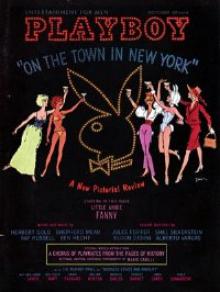 Puppet Show
Puppet Show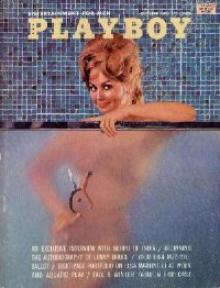 It Didn't Happen
It Didn't Happen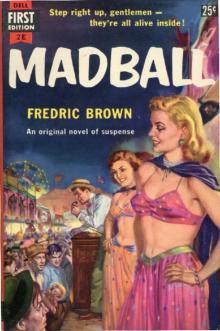 Madball
Madball Happy Ending
Happy Ending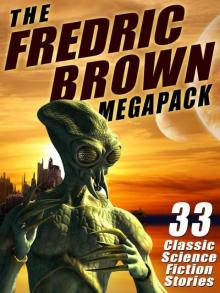 The Fredric Brown Megapack: 33 Classic Science Fiction Stories
The Fredric Brown Megapack: 33 Classic Science Fiction Stories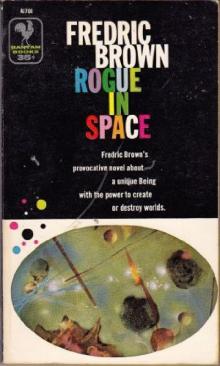 Rogue in Space
Rogue in Space Night of the Jabberwock
Night of the Jabberwock The Dead Ringer
The Dead Ringer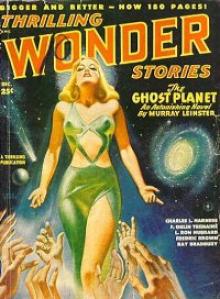 Knock
Knock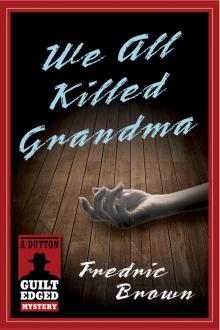 We All Killed Grandma
We All Killed Grandma Space On My Hands
Space On My Hands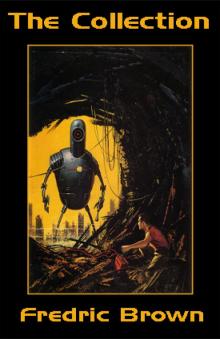 The Collection
The Collection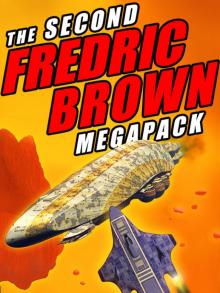 The Second Fredric Brown Megapack: 27 Classic Science Fiction Stories
The Second Fredric Brown Megapack: 27 Classic Science Fiction Stories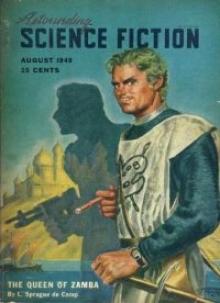 Letter to a Phoenix
Letter to a Phoenix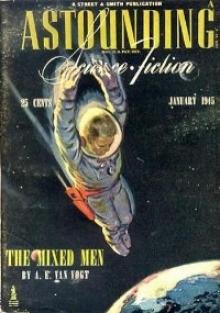 The Waveries
The Waveries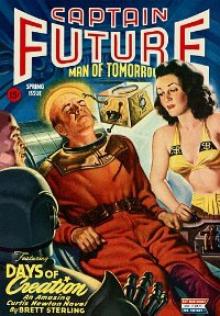 Nothing Sirius
Nothing Sirius The Deep End
The Deep End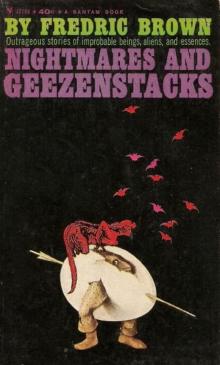 Nightmares & Geezenstacks
Nightmares & Geezenstacks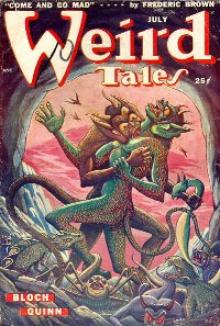 Come and Go Mad
Come and Go Mad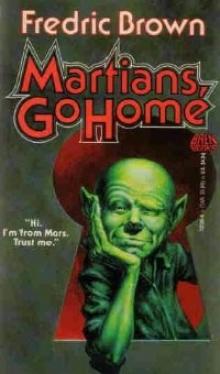 Martians, Go Home
Martians, Go Home